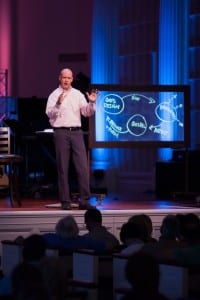 Soon after arriving in 2008 as the new lead pastor of First Baptist Church in West Palm Beach, Jimmy Scroggins realized he was no longer in the Bible Belt.
Soon after arriving in 2008 as the new lead pastor of First Baptist Church in West Palm Beach, Jimmy Scroggins realized he was no longer in the Bible Belt.
The realization occurred when seven of eight couples who signed up for a marriage preparation class were already living together—some after other marriages, some with children from multiple prior relationships in and out of wedlock, and most were not even Christians.
A native of Jacksonville, Fla., Scroggins’ more than 15 years of pastoral ministry experiences there and in Louisville, Ky., were meager preparation for what he found in South Florida.
Scroggins, a two-time alumnus of The Southern Baptist Theological Seminary in Louisville, offered the marriage class to get to know his new congregation and so that he and his wife, Kristin, could model biblical marriage. The Scroggins have been married since 1994 and are parents to six boys and two girls, ages 4 to 17.
“I realized things were going to have to be different here and that class began a journey for me, and therefore for our church, into trying to discover what it would be like if our community felt like we really had open doors to them,” Scroggins told Southern Seminary Magazine in a recent interview at his church, located in the heart of downtown West Palm Beach.
After five years under Scroggins’ leadership, the congregation—now existing in three locations, as well as in two language-based satellites—is thriving. But the multi-ethnic, socio-economically diverse congregation has had to embrace its own unique setting and challenges.
“This situation presents a tremendous opportunity for the gospel of Jesus,” Scroggins excitedly said.
The opportunity, however, comes with major challenges, some of which are the fallout of America’s moral revolution that has turned upside down societal understandings and expectations about the nature of the family, marriage, and sexual activity.
A Graphic to communicate
The inaugural marriage preparation class drove Scroggins to re-tool his ministry approach to communicate more clearly to people whose lives are not shaped by the Bible, with complicated, mixed-up family structures.
Scroggins developed a graphical illustration to help the couples see why their lives were broken and how the gospel is the means of recovering God’s design. The illustration has become Scroggins go-to tool for gospel witnessing and teaching: God’s design (for marriage, family, sex, etc.) is violated by sin that results in brokenness. People attempt to ignore, rationalize, and mitigate their brokenness until, in repentance, they see the gospel as the way of recovery and means to pursue God’s design for their lives.
Still, no graphic fully illustrates the devastating consequences of living contrary to God’s design with “severe brokenness” that may include multiple failed relationships and “all kinds of immorality” that is sometimes multi-generational.
“The brokenness is so deep that even if they turn from their sins and put their trust in Christ you’re just not going to put Humpty Dumpty back together again for them,” he said.
A model for Scroggins is the apostle Paul’s ministry to the church at Corinth.
“I believe that Paul would’ve said, ‘Okay, you’re a new creation in Christ. So from right here, right now today, let’s begin to discover and to recover and pursue God’s design from right here as a new creation in Jesus,’” he said.
Scroggins said some of the couples in the first marriage preparation class have become followers of Christ and have married, but some still face “tremendous challenges” because of the residue of their past choices.
“All of this is so fragile,” he admitted. “It’s hard.”
In recent years, even gay couples—who know, yet reject, the church’s biblically based teaching on sexuality—are bringing their children, for which Scroggins is “very glad.”
Scroggins said it’s not unusual for gay couples or heterosexual cohabiting couples to volunteer for roles that require church membership. The result is a “tough conversation” that frankly addresses the reality that their lifestyles are contrary to God’s standards, making them ineligible for church membership and service.
“We don’t think we have to sacrifice one iota of doctrinal precision or conviction in order to express kindness and love and welcome to our neighbors regardless of their family situation, regardless of their political party, regardless of their stance on morality.”
Moral majority generation and the Obama generation
Scroggins said all Bible-believing evangelicals soon will have to come to terms with the reality that their moral worldview, especially about homosexuality, is a minority position in American culture.
The “Moral Majority generation” that is the backbone of many evangelical congregations must find ways to minister effectively to an “Obama generation” that completely rejects biblical standards of morality, Scroggins said.
The path forward, he said, is for evangelicals to make gospel convictions paramount to “some of our cultural shibboleths” or “our political dogma.”
“We’re going to have to be careful about what parts of who we are and what we believe are truly flowing from the gospel and what parts of those are trappings of a bankrupt Bible Belt, cultural Christianity,” he said.
While the transitory paradise of South Florida is riddled with broken lives and families that epitomize the false promises of the moral revolution, Scroggins is beginning to see the gospel mend lives to recover and restore God’s design, promising an eternal paradise.
“If our people will live as genuine, authentic, imperfect, gospel outposts then they can speak into the lives of people who don’t believe in Christ and don’t know Christ and they can invite them to know him,” he said. “And because of the authenticity and testimony of the outworking of the gospel in their lives they will have a hearing and that is what it’s going to take to penetrate lostness.”
James A. Smith Sr. is the executive editor and chief spokesman for Southern Seminary (sbts.edu).

Comments